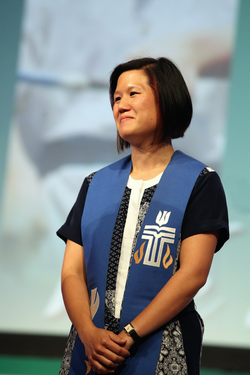Larissa Kwong Abazia dreams of both safety and substance for the 221st General Assembly (2014).
Her running partner, Heath Rada, was elected General Assembly moderator Saturday night, and Kwong Abazia was unanimously confirmed as vice-moderator Sunday afternoon.
As she and Rada take turns moderating plenary sessions this week, “I would hope that commissioners and advisory delegates will be able to bring all they are” to the conversation, she said, “whether we agree or disagree. We trust that the Holy Spirit will be at work and that we may end up in places we never imagined if we weren’t doing this work together.”
For nearly a year, Kwong Abazia has served First Presbyterian Church of Forest Hills, Queens, New York, after a nearly four-year stint as associate pastor at Lake View Presbyterian Church in Chicago.
Queens is the most ethnically diverse county in America, and First Church is no different: 25 countries are represented among its membership, and “15 or 20 languages” are spoken there.
“When people say the church is dying or we need more young people, my experience in ministry is that we are already asking those questions and figuring out the way to be the church in this context,” she said. “We need to strive for a deeper understanding of the context and the community we are in. Is our diversity because of age, socioeconomic or educational backgrounds? If there’s anything I’ve learned about doing ministry, it’s that there’s no book that tells us all how to be a healthy church and how to grow. There’s no one right way to do that.”
She said Rada flew to New York to spend a day with her, helping to cement their relationship a few weeks before General Assembly.
“We had a real honest conversation on the difference between tokenism and representation,” she said. “It really feels like I have a safe space to share feedback with him and toss out our ideas back and forth. I’m comfortable seeing it as a real partnership.”
She predicted that Rada, a retired executive with the American Red Cross, will be a bridge-builder for the church.
“One of the things that Heath has been saying is that when people find common ground, all of a sudden there is the possibility that their conversation can be transformed,” she said. “You love your church? I love my church too!”
“I would love for us to figure out who we are. If we can share our stories so we can learn and build relationships, we won’t feel so isolated or disconnected from the larger church.”
The rest of her family – 2-year-old son Jonathan and her husband, Daniel, a pharmacy professor at Rutgers University – has already returned home, so Kwong Abazia is calling in reinforcements. A ruling elder from her church is on her way to serve as both a General Assembly observer and support for her pastor.
“Our election inspired her to say, ‘We are Presbyterians, so I need to learn more about how the church works,’” she said. “She arrives Wednesday. I can’t wait.”
Serving both a local congregation and now the larger church as well, Kwong Abazia said she’s struck by how both groups must simultaneously live in the already and the not yet.
“The only way reconciliation is possible is for us to be completely honest about who we are, naming our similarities and our differences,” she said. “We can only do that when we are in real relationships.”

